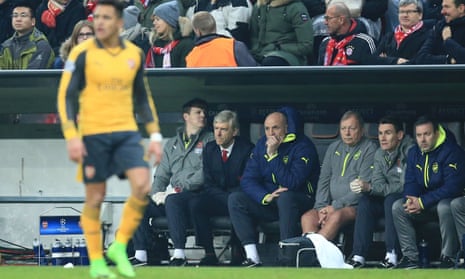At times, as Arsenal’s players flickered in and out of focus during a traumatic second half in Munich, it was almost possible beneath the roars and whoops and gurgles of a sated home crowd to hear the sound of something else. Departures, farewells, changing trains, a little distant exit applause.
For 15 first‑half minutes this Champions League last 16 first leg had swung wildly on its axis. From 1-0 down Arsenal were led back into the game by a passage of thrillingly angry, high-energy centre-forward play from Alexis Sánchez, who became briefly an embodiment of that howling late‑Wenger dissatisfaction at the familiarity of all this – the same script, the same-old not-quite – a man who simply was not going to take it. Sánchez scored a fine goal, led from the front, spooked Mats Hummels and generally held back the tide.
And yet by the hour Sánchez had been reduced to a strolling spectator, visibly frustrated at the ease with which his team‑mates fell away. At the end, as Bayern celebrated the final goal in a 5-1 mauling, Sánchez was crouched by the touchline on his haunches looking utterly stricken, a man rather worryingly apart.
There will, of course, be suggestions that Arsène Wenger should announce his own departure after a defeat that was at times a little disturbing in the speed of its collapse. Things fall apart. The world tends towards entropy. But not usually quite as quickly as this.
Odd as it sounds now, Arsenal had been cheered off at half‑time, the better half of a 1-1 scoreline. In the second half they simply unravelled. Wenger had suggested this was “not the time” to discuss his own future in the pre-match press conference. Well, Arsène, it is now, though not with a sense of anger. Let’s face it, Bayern in February is still a pretty healthy place to be. Arsenal’s stock of current assets are Wenger’s work: sound base, good stadium, place among the elite, some but not that many excellent players.
And, odd as it might sound given the scoreline, Arsenal even played well in patches or at least in a patch. The start was a killer, though. With nine minutes gone Arjen Robben scored a goal of real beauty but also of baffling forehead‑slapping frustration. Playing out from the back Bayern shuttled the ball through nine players in a careful zig‑zag to Robben in that place on the right he always occupies, doing those same old Robben things. At which point he did something so Robben it was almost hackneyed, cliched, too much Robben, an Arjen overload. Come on. The jink inside. The duck on to the left foot. Yes, we know about that. Rest assured someone will be along to close this ... to stop. Oh.
Instead of being pressured Robben wandered on into space, a man who presumably falls out of bed 10 times a night so ingrained is the urge to jink to his left. There was almost time to offer a disbelieving shrug before he spanked a wonderful curling left foot into David Ospina’s top right‑hand corner. It was in its own way the most Arsenal of Arsenal moments. This was Arsenal squared: going behind in a last 16 tie to a goal so familiar it felt like a bizarre Vine-loop in the space-time continuum, interference from another plane in which Arjen Robben is always jinking inside and shooting at goal while Arsène Wenger scratches his nose and looks puzzled on the touchline.
Of course, this was not simply an Arsenal story. Bayern were very good at times. The brilliant Thiago Alcântara scored twice and was a joy to watch all night, a lovely, supple little menace, always able to pass and move and find space.
But even then it was tempting to make the comparison between Bayern’s outrageous playing strength and an Arsenal team that looks oddly underpowered. Bayern brought on Thomas Müller at 4-1 up to score the fifth; Mesut Özil, who now has no goals and no assists in 11 last 16 knockout ties going back to 2011, played 90 minutes but barely registered as a sentient presence, completing 20 passes.
Arsenal spent £96m in the summer and £101m two years before. Their wage bill is a smidgen lower than Bayern’s, their net value a touch behind, fifth in the world plays fourth in the world. And yet at times inside this wondrous illuminated giant doughnut of a stadium they looked like novices up against the all-galaxy champions, or at best an elite team that has simply sat for too long in the same place.
It is almost impossible at moments such as these to see how Wenger can take this team to a higher level, just as it is impossible to argue there is not another manager out there who could build more successfully on the stable foundations he will leave. The question, as ever, is simply who and when. Radical change is rarely a good idea. A Conte-style hard-pressing disciplinarian, some Simeone-style maniac in charge of the current squad might be disastrous. A more familiar Young Arsène type might just bring more of the same. Departures, exit music, farewells. One thing is certain. It all got a lot closer in Munich.

